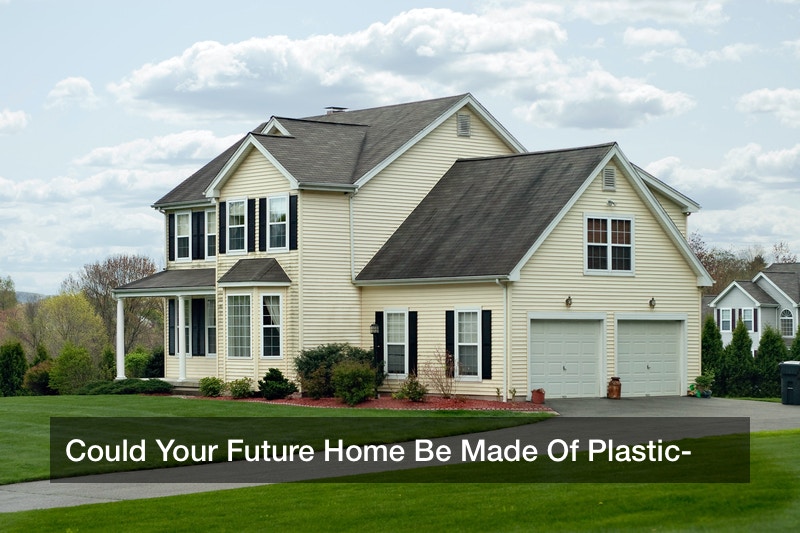Could Your Future Home Be Made Of Plastic?

In 2019, Americans are becoming more conscious of the materials and chemicals we interact with on a daily basis. Since pollution levels of volatile organic compounds can actually be up to five times higher indoors than outdoors, many consumers are taking a close look at the products, food, and materials they encounter. Of course, there’s one material that’s impossible to avoid, even if you’d like to — plastic.
People today are using plastic more than ever before. Today the world makes and consumes about 600 billion pounds of plastic yearly, and the market is still growing about 5% a year. This plastic waste often ends up in landfills or, even worse, in oceans and the environment worldwide, where it can do damage to natural ecosystems. While many people have presented possible solutions to help deal with our growing plastic waste problem, some are taking a proactive approach and are using this waste in an innovative way: turning it into affordable housing.
Plastic Problems Worldwide
Plastic pollution isn’t exclusive to just one part of the world. While just a few select countries make up the top contributors to pollution, plastic quickly becomes a global issue due to its overall impact on the environment. Addressing plastic pollution is a serious issue, but because of the durability of plastic and how easily it can be molded into a variety of items, plastic waste construction might quickly become a solution. Many companies and areas are already using plastic waste to construct affordable housing for people in crisis or in need of low-cost homes.
Energy Efficient And Affordable
Many plastic homes currently being constructed are built using modular methods, making them even better for the environment in more ways than just removing plastic pollution. Modular constructions reduce energy consumption during the building process by around 67% and reduces energy costs later on for occupants. Additionally, because these homes are constructed using plastic waste rather than new materials, they can be set up at a fraction of the cost of traditional construction. The plastic bricks that are used most often currently are designed to interlock like Lego bricks, allowing for short build times. This makes them a perfect choice for low-cost building solutions for use as emergency shelters and temporary housing options for the homeless. However, this doesn’t mean it can’t also be used in your own home in the future.
Moving To Residential Real Estate
While currently plastic waste homes are only used in certain areas under certain conditions, it’s possible that these unique constructions could be the future of residential real estate. Currently, most modern homes are framed using wood, which has been the traditional method for centuries. However, this method isn’t fool-proof. Wood only needs three things to rot: water, oxygen, and favorable temperature between 40 and 105 degrees Fahrenheit. Comparatively, plastic is incredibly durable and low-maintenance, meaning you won’t need to worry in the future about as many home repairs. And if you’re one of the 28.8 million small business owners in the U.S., it might be worth considering reusing plastic for your next location, too.
You might not be in the market for a new home right now, but if you’re planning on a major remodel or addition, you may want to consider using alternative building materials like recycled plastic waste somewhere in your plans. About 35% of remodeling jobs involved the whole home, so if you’re thinking about making some big updates, this could be a good choice for you. Just be sure to first check with local renovation companies and contractors as well as homeowner’s associations to see if you’ll be able to use this material.
Plastic waste is currently being used in construction and could be a solution to providing both affordable housing while also cleaning up plastic pollution worldwide. While these homes might not be for everyone, it could be the green answer to two major global issues at once. Would you consider living in a plastic waste home, once they’re more common in residential real estate?
